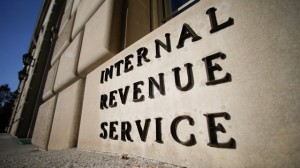This Week: A Deeper Look at Notice 2014-67, Rev Proc. 97-13 – What they Mean for Issuers, Colorado Authorities facing more IRS Audits, and IRS Releases Final Arbitrage Rebate Overpayment Rules
CURRENT EVENTS
IRS News this Week…
IRS Auditing Bonds Issued by Colorado Authorities in 2007 (B Buyer, November 13, 2014)
This week, two separate issuers in Colorado posted notices on EMMA regarding IRS audits of their bonds issued in 2007 – one for a university and the other a health facility.
The Colorado Educational and Cultural Facilities Authority issued $39.9 million for the University of Denver, which used the proceeds to refund their 2001 and 2005 bonds respectively. Some of the bonds have since matured.
The Health Facilities Authority’s issued bonds for the Parkview Medical Center – both new money and refunding bonds. $38 million of hospital revenue bonds were used to finance a stand-alone emergency facility and nearly $31 million of hospital revenue refunding bonds to refund their 1998 and 2001 Bonds.
Both audits are being conducted as routine examinations, with the Cultural Facilities being part of a TEB examination project involving 501(c)(3) bonds.
As shared in September, under the IRS tax-exempt bond office’s market-segment program, agents conduct random audits of bonds in certain categories. TEB director Rebecca Harrigal said that her office will also conduct audits in sub-categories of that program.
Health Facilities Authority disclosed that two other 2007 bond issues have been audited in the last 12 months.
IRS Releases Final Regulations on Arbitrage Rebate Overpayments (B Buyer, November 12, 2014)
Less than 30 days after issuing interim guidance on Management Contracts and Accountable Care Organizations, the IRS has finalized its guidance on arbitrage rebate overpayments.
Arbitrage rebate is generally due when bond proceeds are invested at higher yields than what the bonds were issued at – resulting in a profit. Under tax law, the excess earnings generally need to be rebated back to the government to maintain the tax-exempt status of the bonds.
Calculations need to be made regularly with rebate installments made at least every 5 years. The final payment is due 60 days after the final bond is redeemed.
Richard Chirls, an attorney at Orrick, Herrington and Sutcliffe LLP in New York, explained that there has been an increase in the number of overpayment requests in recent years. He said “This is a result of the current very low investment rates which can have the effect of reversing the positive arbitrage that was earned in earlier years,”
Under the final regulations, an issuer must file a claim for a refund of an overpayment no later than two years after the final rebate computation date for the bond issue.
While over at the SEC…
SEC: Expect More Muni Enforcement to Come…Not Less (B Buyer, November 5, 2014)
Citing their division’s important precedents with first-of-their-kind enforcement actions in recent months, Andrew Ceresney, director of the SEC’s division of enforcement shared three additional areas of focused enforcement which are next in line…
These key areas are:
- pension fund abuses
- pay to play violations
- undisclosed conflicts of interest
Additionally, Kent Hiteshew, director of Treasury’s State and Local Finance Office said, “The industry should be more cognizant of how the market is perceived by policy makers,”
Why? Federal agencies perceive that the muni market has, so far, escaped the same level of scrutiny as their counterparts in the corporate and other capital markets.
“I think it’s fair to say this is a place we’re here to stay,” Ceresney said, clearly indicating they will continue to be a growing presence in trying to affect market behavior.
OUT & ABOUT
Issuer Discloses MCDC Document (B Buyer, November 12, 2014)
In what appears to be an accidental filing, The Berwick Area School District in PA posted its completed MCDC questionnaire on EMMA last Monday.
In the filing, the District detailed deficiencies with two of their 2010 bond issuances. Among the items listed were late filings of annual reports, not filing certain operating data required by its Continuing Disclosure Agreements and failing to file rating agency changes.
Responses by bond counsel has been mixed, including voicing concern about issuer confusion over MCDC requirements to whether such a filing on EMMA could be used as evidence in a lawsuit.
Under the MCDC Initiative, Issuers have until December 1st to voluntarily file their compliance questionnaire with the SEC. Underwriters also had to file their disclosure in September. Once the December deadline has passed, the SEC will begin combing through the filings to determine if further actions are warranted.
Conferences/Events for the rest of 2014:
In November: Transportation/P3s:
The Transportation Finance/P3 Conference (Nov 16th-18th, Arlington, VA)
IRS Notice 2014-67 and Rev Proc. 97-13 – An Issuer’s View
 On October 24, 2014, the IRS issued interim guidance regarding Management Contracts and Accountable Care Organizations (ACOs), namely Notice 2014-67 (the Notice).
On October 24, 2014, the IRS issued interim guidance regarding Management Contracts and Accountable Care Organizations (ACOs), namely Notice 2014-67 (the Notice).
To provide a little history, let’s look at Rev Proc. 97-13.
Revenue Procedure 97-13 provides the framework for issuers to evaluate whether a management contract gives rise to private business use for purposes of the tax-exempt bond rules and several safe harbors.
However, during the last 17 years, the safe harbors contained in Rev Proc. 97-13 have become increasingly challenging to providers, making compliance with the safe harbors unnecessarily complex and costly.
Challenges increased, and in particular, after the passage of the ACA, requests for clarification and improvement have come from virtually every facet of the tax-exempt community. Notice 2014-67 is designed to address both the ACO and management contract aspects.
First, let’s look at the ACO aspect:
As part of the Patient Protection and Affordable Care Act (the ACA), certain healthcare organizations who participate in the Medicare Shared Savings Program risked inadvertently finding themselves on the wrong side of private business use rules for their tax-exempt bonds.
As healthcare professionals shift aspects of their operations to meet the mandates of increasing the quality of care while reducing overall costs, many have turned to management contracts and innovative professional partnerships to share costs and resources.
For Management Contracts:
The Internal Revenue Code of 1986 (the Code) provided strict rules regarding the amount of bond proceeds which can be used in a trade or business by a “non-exempt” person or for “non-qualifying purposes” – which gives rise to private business use.
For governments and other municipal divisions, this posed challenges in having private parties manage or perform certain services in those bond-financed facilities. Under Rev Proc. 97-13, certain “safe harbor” rules were established to address these concerns, however, the rules were rather tricky and issuers could still easily get tripped up.
Under Notice 2014-67, these two provisions provide more flexibility:
- Five Year Contract Safe Harbor – this provides that compensation may be stated amount, periodic fixed fee, capitation, per-unit, a percentage of gross revenues – or any combination of these. It cannot, however, be based on net revenues – which is consistent with Rev Proc. 97-13.
- Productivity Awards – Prior to the Notice, productivity awards were carefully scrutinized and were generally only available as part of longer-term contracts – say 10 to 15 years. Additionally, they were based on revenues OR expense improvements, but not both. The Notice provides a new type of productivity award, which can be issued annually and for improvements in quality of service, rather than for increases in revenue or expense savings. The Notice also provides for tiered productivity clauses in five year contracts.
There will be much more information coming in the weeks and months to come as professionals discuss and apply the new rules within the Notice. The IRS is seeking comments and will continue to evaluate its impact – in short – further changes could be on the horizon.
In closing, it may be advisable to include a clause in your management contracts allowing for amendments with applicable regulations, to avoid further complications or contract disruptions down the road.
We hope you enjoyed this week’s edition of the Monday Muni Minutes. As always, your comments are welcome…
Have a great week!
To your compliance success,
Debbie

The greatest compliment you can pay us is to share this newsletter with your issuer friends….
P.S. As we get ready for Thanksgiving and the Holiday Season next week, please share a comment with us this week on what you are thankful for – business or personal. Next week, we will be preparing a special segment to help us get into the holiday spirit!
P.P.S. Want a one-click way to get faster information? If you are on LinkedIn, you can get access to breaking muni news articles as well as interesting compliance tips and resources, posted by us several times a week. Join our private Group Page, and follow us on our Company Page.



